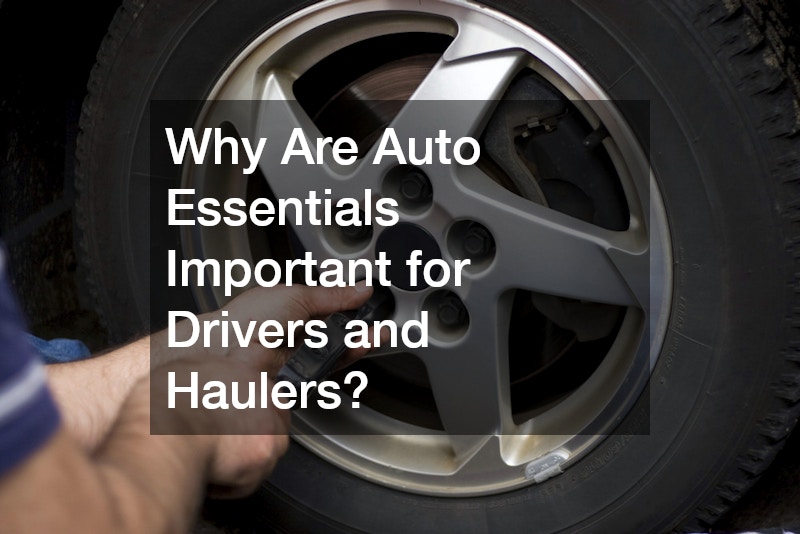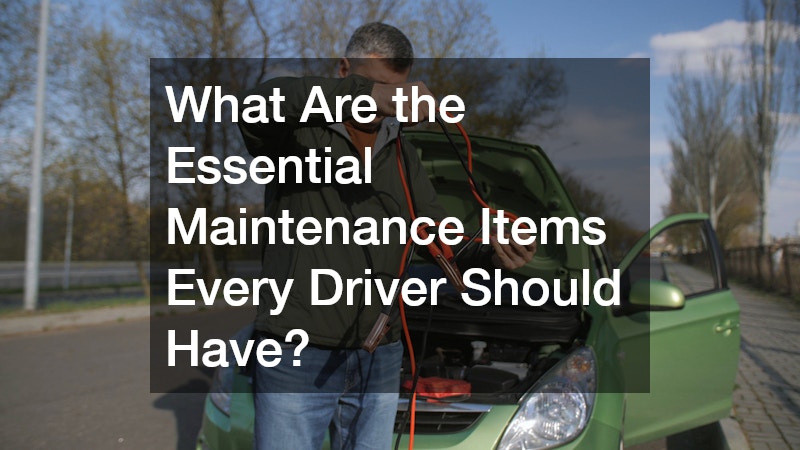What Every Auto Essentials Store Should Offer for Drivers and Haulers
Introduction
In the world of driving and logistics, whether you’re commuting across town or managing long-distance freight routes, one thing is universally true: being prepared can make or break your day. Auto essentials stores serve as the backbone of that preparedness. These stores are more than just a place to buy wiper blades or engine oil—they are lifelines for drivers and haulers alike, offering safety, comfort, maintenance, and peace of mind in one stop.
From everyday drivers dealing with unexpected breakdowns to heavy hauler operators managing transload freight across state lines, the range of needs is vast. A reliable auto essentials store recognizes those needs and responds with a well-rounded inventory of products that address emergencies, improve comfort, and ensure vehicle readiness for every mile ahead.
Below, we explore what every auto essentials store should carry to serve drivers of all types—from families on a road trip to professionals responsible for towing, truck repair, and everything in between.
Why Are Auto Essentials Important for Drivers and Haulers?
The Benefits of Being Prepared
Preparation isn’t just about avoiding inconvenience—it’s about reducing liability, preventing accidents, and protecting investments. For example, a hauler transporting expensive cargo can’t afford a major delay due to a missing part or broken driveshaft. Likewise, an everyday driver who faces a flat tire far from home can quickly turn a minor hiccup into a major headache without the right gear.
Prepared drivers are safer, more efficient, and less dependent on costly services. A well-stocked vehicle and regular visits to a dependable auto essentials store ensure readiness for common scenarios, from weather-related issues to simple maintenance.
Avoiding On-road Emergencies
Even seasoned drivers and experienced towing professionals can encounter roadside emergencies. A sudden mechanical failure or flat tire on a remote stretch of highway can lead to dangerous situations. In some cases, drivers may not be able to reach a truck repair service quickly, especially if towing large trailers or operating in rural areas.
Auto essentials stores should offer quick-fix solutions: tire inflators, coolant, spare bulbs, and battery jumpers that keep drivers moving without delay. For commercial operators, especially those hauling transload freight or working under tight schedules, minimizing downtime is crucial to meeting delivery deadlines and avoiding penalties.
Ensuring a Smooth Journey
Driving is more than just getting from point A to B—especially when you’re spending 10+ hours on the road. Long-haul truckers, professional movers, and delivery drivers all benefit from gear that enhances their comfort, organization, and performance. GPS systems, ergonomic seat cushions, communication tools, and storage options all contribute to smoother, more enjoyable rides.
What Are the Must-Have Safety Essentials for Drivers?
First Aid Kits
Accidents and injuries can happen at any time, whether it’s a scraped knuckle from loading cargo or a more serious incident. Every vehicle should carry a first aid kit tailored to the type of travel being done. Kits for commuters may be simple, but those for professional haulers and movers should include more robust supplies, such as trauma pads, antiseptic sprays, and thermal blankets. This is not just about safety—it’s also a critical legal precaution in case you’re involved in an accident and need to assist until emergency services arrive.
Emergency Warning Devices
Visibility is key during an emergency stop. Reflective triangles, road flares, and high-visibility vests should be available in every auto essentials store. They’re particularly important for those in the heavy duty towing and truck repair industries who spend time around broken-down vehicles on busy highways. Even if you’re not a professional, having warning devices on hand could prevent further collisions and keep you safe while waiting for help.
Portable Air Compressors
A flat or low tire can be a serious hazard. Portable air compressors, often compact and powered via a car’s cigarette lighter, allow drivers to refill their tires on the go. This tool is essential for those towing trailers, where multiple axles increase the likelihood of air pressure issues. Some models also include digital pressure gauges and emergency lighting, combining safety and function in one device.
How Can Auto Essentials Stores Cater to Long-haul Truckers?
Comfort and Convenience Products
Long-haul driving is grueling work. Quality-of-life items can drastically improve the daily experience of truckers. These include memory foam seat cushions, compact coolers for food storage, personal fans, foldable bedding, and even electric cooking pots. An auto essentials store should carry a range of driver comfort products tailored for cabs and sleeper trucks.
Navigation and Communication Tools
Basic GPS systems don’t cut it for commercial drivers. Truck-specific GPS units account for weight, height restrictions, and HAZMAT routes. Two-way radios, noise-canceling headsets, and signal boosters are also crucial tools. When managing tight delivery windows or coordinating with dispatch while towing large trailers, reliable communication tools are indispensable.
Heavy-duty Maintenance Supplies
Heavy haulers require more than a basic set of tools. Look for grease fittings, diesel fuel additives, jumper cables with heavy-duty clamps, and power inverters. Driveshaft components, reflective tape, and torque wrenches are all useful to those who may need to perform minor truck repair roadside. Products designed for heavy vehicles should be prominently featured in any store that serves truckers.
What Are the Essential Maintenance Items Every Driver Should Have?
Oil and Fluid Replacement Tools
Regularly checking and replacing oil, coolant, and other fluids keeps a vehicle running smoothly. Auto essentials stores should carry small jugs of high-quality oil (in multiple weights), radiator flushes, brake fluid, and power steering fluid. Funnel kits, oil change pans, and single-use gloves are helpful add-ons that make DIY maintenance easier.
Basic Repair Kits
Every driver should carry a basic tool kit with items like pliers, socket wrenches, duct tape, utility knives, and zip ties. Haulers or those working with trailers may benefit from kits including trailer light testers and spare wiring harnesses. For the everyday commuter, kits that include compact tire repair tools or battery terminals can be a lifesaver.
Battery and Charging Accessories
Dead batteries remain one of the top causes of roadside calls. Battery chargers, lithium jump starters, and replacement terminals help reduce dependency on tow trucks. For those operating in remote areas or supporting commercial fleets, investing in solar-powered trickle chargers or dual-battery jump systems adds an extra layer of preparedness.
What Travel Accessories Elevate the Driving Experience?
Advanced GPS Systems
Modern GPS devices for vehicles offer more than maps. Voice assistance, live traffic updates, predictive rerouting, and compatibility with smart devices allow drivers to stay focused and informed. For professionals in towing or transload freight delivery, truck-friendly GPS systems help avoid narrow roads and weight-restricted bridges.
Comfort-enhancing Accessories
Driving for long hours causes strain and fatigue. Lumbar cushions, adjustable armrests, steering wheel covers, sunshades, and cooling gel seat pads can make the experience significantly better. These products may seem minor but contribute heavily to driver health and long-term comfort—especially important for professionals who log thousands of miles per week.
Entertainment Options
Modern drivers often rely on podcasts, audiobooks, or satellite radio to stay entertained. Auto essentials stores should carry Bluetooth FM transmitters, phone mounts, and portable power banks. Truckers with sleeper cabs might also appreciate compact televisions, tablet mounts, or personal Wi-Fi devices for their downtime.
What Storage Solutions Should an Auto Essentials Store Offer?
Trunk Organizers
A well-organized trunk means safer driving and quicker access to emergency gear. Collapsible bins, modular compartments, and secure tie-down systems are ideal for delivery drivers or movers carrying tools, documents, or parts.
Roof Racks and Carriers
Roof-mounted cargo boxes or open racks provide essential space for cross-country trips or moving jobs. Those towing enclosed trailers may still need rooftop storage for personal items or to separate gear from the main load. Auto essentials stores should offer options for both cars and trucks with various weight limits and attachment styles.
Under-seat Storage Solutions
For pickup trucks and vans, under-seat storage boxes keep tools, flares, or first aid kits hidden but accessible. Custom-fitted units tailored to specific makes and models are especially useful for fleet vehicles and service techs.
Why Are Seasonal Products a Necessity in Auto Essentials Stores?
Winter Driving Essentials
Snow, ice, and freezing temperatures pose serious risks. Snow brushes, tire chains, heated mirrors, antifreeze, and battery warmers are just a few seasonal items that should be available. Many auto body repair shops report increased collision rates in the winter, many of which could be avoided with the proper equipment and preparation.
Summer Maintenance and Accessories
Extreme heat can lead to tire blowouts and engine overheating. Auto essentials stores should stock sunshades, high-temp radiator hoses, extra coolant, and UV-protective products. These are especially important for haulers and movers operating in the southern U.S. or desert regions.
All-weather Preparedness
Year-round products like all-season floor mats, rubber cargo liners, rain-repellent glass treatments, and weatherproof covers help keep vehicles clean and protected regardless of location.
What Are the Top Security Products for Vehicle Safety?
Car Alarms and Security Systems
Modern alarms offer GPS tracking, engine immobilizers, and smartphone notifications. These systems help protect not only personal vehicles but also trailers, tools, and freight. For business owners managing fleets, adding professional-grade security can prevent costly theft.
Steering Wheel Locks
A visual deterrent, the steering wheel lock remains one of the most effective theft-prevention tools. It’s affordable, easy to use, and a smart investment for those leaving trailers or haulers parked in high-risk areas overnight.
Window Security Film
Security film prevents glass from shattering easily during a break-in attempt. It also adds a level of privacy, UV protection, and thermal insulation. For drivers transporting high-value equipment or tools, this added layer can be a worthwhile upgrade.
What Role Do Eco-friendly Products Play in an Auto Essentials Store?
Eco-friendly Cleaners and Fluids
Many traditional car care products contain harsh chemicals. Environmentally friendly alternatives—such as biodegradable soaps, low-toxicity brake fluid, and green de-icers—are growing in popularity. Drivers concerned about sustainability increasingly seek these products out.
Sustainable Car Accessories
Products made from recycled materials—like rubber mats, seat covers, or cleaning cloths—offer a sustainable alternative. Auto essentials stores that promote these items can attract eco-conscious drivers without sacrificing quality.
Reusable Maintenance Tools
From refillable oil containers to solar-powered battery maintainers, reusable tools reduce waste and offer better ROI over time. In fleet operations, such eco-friendly upgrades often meet regulatory and environmental standards as well.
How Do Auto Essentials Stores Adapt to Technological Advancements?
Integration with Smart Technology
Tech-savvy drivers expect integration with smartphones, voice assistants, and vehicle diagnostic apps. Auto essentials stores should offer compatible accessories like smart dash cams, app-based OBD2 scanners, and wireless vehicle locks.
Electric Vehicle Products
With the rise of EVs, new needs emerge. Charging cables, adapters, EV jack pads, and electric-safe tools should be included in the product lineup. Even truckers and movers are beginning to explore hybrid and electric towing vehicles.
Future Trends in Auto Essentials
Expect to see more emphasis on automation, AI diagnostics, and digital maintenance tools. Drones for delivery, smart trailers with sensors, and autonomous driving tech will eventually require a new generation of auto essentials—items forward-thinking stores should already be preparing to offer.
Conclusion
From cross-town movers to cross-country haulers, every driver depends on reliable tools and equipment to stay safe, legal, and comfortable on the road. Whether it’s an everyday commuter managing local traffic or a heavy hauler transporting oversized trailers across state lines, the demands of the road are diverse—and often unpredictable. That’s where auto essentials stores step in, acting not just as retailers, but as vital partners in vehicle readiness. Stocking everything from first aid kits and jump starters to GPS systems, emergency tools, and smart security features, these stores help drivers prepare for the expected—and the unexpected.
The impact of being prepared stretches beyond personal convenience. Imagine breaking down on a busy highway without a portable compressor, or trying to navigate unfamiliar rural routes without a truck-specific GPS. Whether you’re responding to an emergency, trying to avoid the involvement of an auto accident attorney, or recovering after a mechanical failure, access to quality products can prevent further complications, reduce repair costs, and protect both people and property.
For professionals managing transload freight, coordinating heavy duty towing services, or operating complex logistics involving trailers and truck repair crews, the role of a well-equipped auto essentials store becomes even more critical. These operations rely on speed, reliability, and precision. A missing fuse, faulty driveshaft, or delay in getting the right tools can cost more than money—it can damage client trust, delay schedules, and compromise safety.





